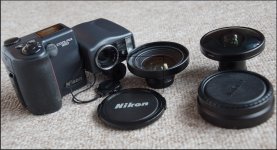I'm not sure I could live without IBIS now, and mirrorless AF accuracy blows DSLRs out of the water.
That said, there isn't really any significant image quality advantage. My D850 and D810 files still stand up to pretty much anything. Although I don't miss having to use a tripod all the damn time, calibrating lenses, focusing manually in magnified live view etc. If you don't mind all that though then DSLRs are still fine cameras. In fact, for low light event photography, I'd still probably prefer a D850 over any mirrorless camera.
I'd wager a Z9 will out focus the very capable D850.
I'll wade into this thread - again
Photography is mainly an amateur pursuit. In terms of camera sales the overwhelming majority are bought by amateurs. The ratio of working pros to amateurs is a very low one.
The most popular form of amateur photography is landscape. The advantages of mirrorless in this genre relate to lightness (a common complaint amongst hobbyist photographers is mass but I will debunk that shortly) and perhaps AF frame coverage.
A comment in this thread re focusing was mentioned. You can manually focus in live view on a DSLR and enhance it on a much larger screen than an EVF. I dare say I wouldn't use the EVF and just use the rear screen on these.
Most Landscapes are shot from a tripod, the shutter speeds involved requires this. They're also a great way to aid composition and ensure the frames level. The ease of handholding isn't a big thing in this genre and it's invariably carried in an expensive rucksack.
A lot of 35mm format mirrorless bodies still use large heavy optics. Zooms are beloved of landscape photographers and they're heavy. A heavier body actually is better for tripod use as it makes it more stable as it balances better as more mass is over the tripod. Light bodies with these big complex optical formula zooms aren't a great mix. Christ even the D850 with a 24-70 2.8 isn't optimally balanced, a 645z with a 45-85 sits much better on a tripod. Heavy body, light lens is a better mix for tripod shooting than light body, heavy lens.
Sensor dirt - maybe the Z9 with the sensor gaurd solves this one but mirrorless bodies, due to the lack of the mirror covering the sensor get a lot more sensor dirt. For landscapes you stop down-dust spots are annoying and time consuming to fix properly.
Landscape photography is often done over the winter and dawn/sunrise and sunset/dusk. This means cold fingers. Big buttons widely spaced is what you want. The larger DSLR form wins here.
Some pluses in the new mirrorless bodies - inbuilt focus stacking, that's in the Z7. It'll take a series of shots focused differently for you to stack. There's no real reason this couldn't feature on a DSLR.
Newer lens mounts but for stopped down shooting it's not the big thing you think. The F8 vs F11 mft charts for the new mirrorless stuff vs older DSLR stuff isn't showing a leap on.
The people who make/build these things are moving towards mirrorless. So for the latest sensor tech and features you may wish to upgrade but there's going to be compromises and things you'll really miss on your DSLR and things you won't like on the new camera.

